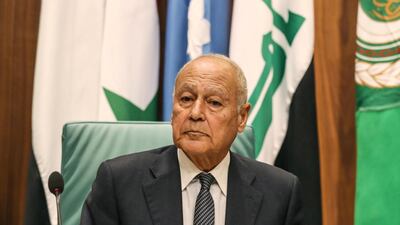Arab League chief Ahmed Aboul Gheit said he understood Palestinian concerns over the UAE's move to normalise relations with Israel but the accord prevented the certain annexation of Palestinian land.
Mr Aboul Gheit also painted a grim picture of the current situation in the Arab world in an interview with the Abu Dhabi-based Sky News Arabia.
He said the turmoil in which much of the region was mired in the past decade has given non-Arab Muslim nations Turkey and Iran the opportunity to try to dominate the area.
Mr Aboul Gheit, a career Egyptian diplomat who took the helm of the Arab League in 2016, also rejected claims the organisation was ineffective and should be disbanded after 75 years.
“I fully understand Palestinian concerns but, on the other hand, I have personally focused on a very specific point and that’s that the UAE and the US reached an understanding that was forced upon the Israeli side to suspend the annexation of Palestinian lands," he said.
“I see that as a major development. I personally think that annexation was certain to happen. Now that it is frozen, it will not be activated again.”
Mr Aboul Gheit said that without the UAE-Israel accord, Israel would have announced the annexation of Palestinian lands in the West Bank the day after the US presidential election on November 3 if Donald Trump was re-elected.
“I say that with the largest degree of certainty,” he said.
There has been recent criticism of the League's role in dealing with the region's pressing issues, and some in Egypt described it as a talking shop.
Mr Aboul Gheit angrily rejected such criticism: “People say, ‘finish the Arab League now that it is 75 years old'. OK, finish the Arab League and hand over the region to Iran and Turkey, and the two can establish a new Middle East organisation to which they invite Israel and the three of them can dominate the Arab world.
“We, the Arabs, must wake up because there is an imminent threat to the Arab identity of this region, which must be defended.
"There are 350 million Arabs. There is one language, culture, armies, states and will power.
"The Arabs have existed throughout history and will exist for many hundreds of years to come.”
He traced a perceived reduction of Arab influence in the region to the uprisings that started in late 2010 in Tunisia before spreading to Egypt, Syria, Libya and Yemen.
"They launched a new situation in the region, the bullying by regional parties and the extreme weakness of some Arab nations and the collapse of others," he said.
Mr Aboul Gheit spoke of Iranian influence in some Arab nations and the direct military intervention by Turkey in Iraq, Syria and Libya.
He also mentioned Ethiopia, which he said was imposing a “measure of hegemony” over the Nile.
The Great Ethiopian Renaissance Dam provoked fears from downstream nation Egypt that the structure would catastrophically reduce its share of the river’s waters.


